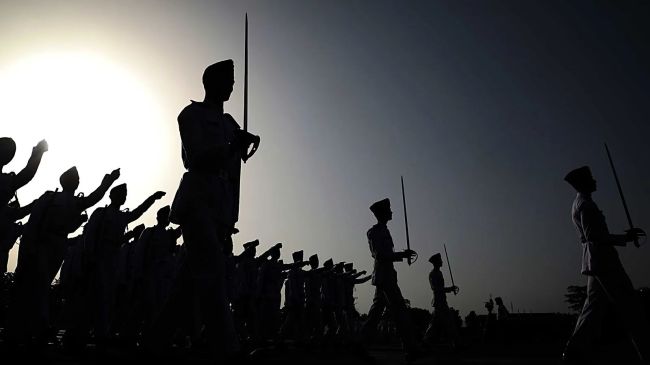Opinion India’s Gulf strategy wins: Acquittal in Qatar, $78B LNG deal and more
The resolution of the case is a manifestation of the success of the government’s Gulf and West Asia policy. The region has never occupied a more salient priority among India’s top leadership than under PM Modi.
 Relations have flourished in the areas of energy, investments, project exports, food and health security, civil aviation and significantly, defence and naval cooperation.
Relations have flourished in the areas of energy, investments, project exports, food and health security, civil aviation and significantly, defence and naval cooperation. An unfortunate chapter in India’s relations with Qatar has come to an end. The return of the former India Navy officers to India, safe and sound, and their acquittal is a most welcome development. There is a palpable sense of relief.
Qatar is a unique country in the Gulf that has always punched well above its weight. It is a tiny piece of territory abutting the vast expanse of Saudi Arabia and Oman that has the highest per capita income in the region. It has successfully harnessed its mammoth oil and gas wealth to develop its infrastructure at a pace and scale that is nothing short of miraculous. Qatar’s grandeur was in evidence during the FIFA World Cup in 2022.
Politically, Qatar has its fingers in several pies. It flaunts its risk-taking appetite. It has been in the eye of the intra-Gulf political storm when its relations with Saudi Arabia broke down and it was boycotted by the Gulf Cooperation Council (GCC) on charges of supporting Islamist and radical groups that threatened moderate regimes. It has been an outlier in the Arab world by maintaining significant links with Iran and yet hosts an American military base. In recent years, it played an active role in supporting the US project of exiting Afghanistan and installing the Taliban in Kabul. It is once again involved in doing what it does best — playing the role of a mediator, this time in the most vexatious conflict between Israel and Hamas. It has, in the form of Al Jazeera, built the most powerful media tool that has shaken the Arab world.
Qatar’s confidence in its internal stability and social fabric is no less remarkable. There would scarcely be a country in which the proportion of foreigners is five times the number of its own citizens. Qatar has made a strategic choice to make Indians the largest pool of foreign workers in the country, who number 800,000 in a total population of less than 3 million. The Emir of Qatar and al Thani family are the first to acknowledge and applaud the contribution of Indians in the Qatar miracle.
The source of Qatar’s success has been the al Thani family and the Emirs who have ruled Qatar with a firm hand. Successive Indian governments have worked to develop close ties with the Emirate. The first breakthrough was made by the visit of former Prime Minister Manmohan Singh to Qatar in 2008. Relations have assumed new heights ever since the first visit of Prime Minister Narendra Modi in 2016. After the visit, there have been close, regular and high-level contacts. Relations have flourished in the areas of energy, investments, project exports, food and health security, civil aviation and significantly, defence and naval cooperation. Trade stands at $18 billion. A $78 billion deal for the import of LNG was signed a few days ago, ensuring that Qatar will play a critical role in India’s transition to a gas-based economy.
Against this background, the saga of the arrest of eight former Indian naval officers on charges of alleged espionage was an aberration and an inexplicable development. The charges against them in 2022 came as a surprise to India and were countered and contested. The case was handled between India and Qatar behind the scenes, given the high stakes involved. India’s handling was mature and restrained, without falling into the temptation of hyperbole or display of public anger borne of deep concern for those arrested.
The resolution of the case is yet another example of how the government under Prime Minister Modi has managed to achieve positive outcomes in highly complex and sensitive situations with astute and quiet diplomacy. In this particular case, given the structure of the Qatari state, there is no doubt about the personal role that would have been played by the Prime Minister, supported by his senior-most advisers. The PM is now set to visit Qatar to convey his gratitude.
More fundamentally, the resolution of the case is a manifestation of the success of the government’s Gulf and West Asia policy. The Gulf region has never been a greater priority among India’s top leadership than it is today. The Prime Minister’s visit to the UAE and the special status he is being accorded there is the most recent example of this. India has built deep and robust ties with Saudi Arabia, UAE and Oman while also building solid relations with Qatar. India has become a full member of the Combined Maritime Forces headquartered in Bahrain. The relationship with Israel has never been closer. Relations with Egypt have been energised, while high-level contacts have continued with Iran. These multidimensional partnerships, forged between equals, are bearing fruit in ways that directly promote India’s national development and security priorities.
The writer is Member, National Security Advisory Board and former Deputy National Security Adviser. View are personal






